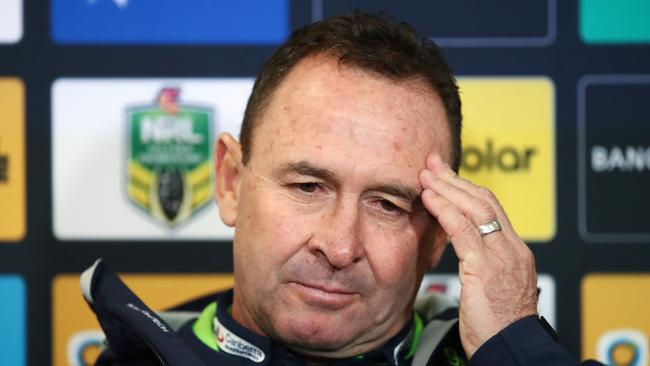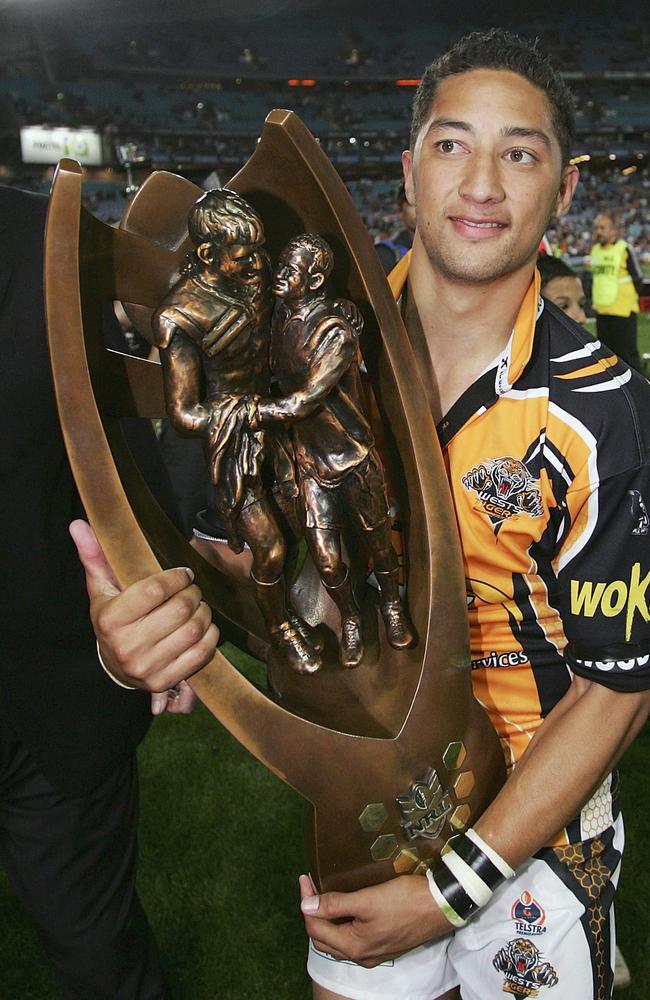Flawed NRL finals wildcard system rewards mediocrity, writes Paul Kent
It is easy to feel uncomfortable with the NRL’s new wildcard concept. It is even easier not to like it at all. Basically, it’s rewarding losing teams, writes Paul Kent.

It is easy to feel uncomfortable with the NRL’s new wildcard concept. It is even easier not to like it at all.
Is the NRL a sport or a sideshow gimmick? Will every team be required to carry three clowns juggling lottery balls, a bearded lady and a donkey in a muumuu to, as they say, keep the interest of the next generation?
When did rugby league stop being a sport?
On the surface the NRL’s concept makes sense.

MORE NRL NEWS
EELS TEEN SENSATION: MUM MADE ME PLAY FOR PARRA
MONDAY BUZZ: WEEKEND HIGHLIGHTS AND LOWLIGHTS
It is designed to slow an inevitable decline in viewers late in each season as fans realise their team can no longer make the playoffs and so turn over the television in favour of MAFS re-runs or catch up with the latest Kardashian plot twist.
But that thinking is flawed in itself.
To prevent fans switching off because their team is not in playoff contention is to manufacture false hope. It is a deception on the fans.
The inevitable conclusion under this model, it would seem, is to get to the end of round 25 where, eventually, all 16 teams are still eligible.
What good is that?
The NRL believes it has good foundations for change.
Last season, instead of 36 “dead” games - where neither team was playing for a spot in the playoffs - there would have been only eight “dead” games under the top 10 format.
It is a mirage for the fans, not relief.
The belief is by expanding the finals format fan interest will last longer into the season.
The English Super League tried to similarly fuel fan interest with its Super 8s concept between 2015-18 (where bottom teams played to stave off relegation) before lack of interest saw it die a natural death.
As for the realities of 10 teams now qualifying for the NRL playoffs, so far no team has ever won the premiership from outside the top four, let alone below.
Indeed, only two teams, Wests Tiger (2005) and Sydney Roosters (2002), have come from as low as fourth to win the title.
It gets worse.

In the NRL’s 21 seasons only one team finishing 10th has had a winning record - but it comes with an asterisk.
Manly finished 10th in the 1998 season with a 13-11 record. But that was the NRL’s inaugural season, a 20-team competition.
Since being reduced to 16 teams no 10th-placed team has finished with a winning record, the best being Parramatta (13-13) in 2014, finishing equal on points with eighth-placed Brisbane, and New Zealand (12-12) in 2006.
Vince Lombardi is crying tears. No longer is winning everything, it is not even necessary.
Adding the ninth and 10th placed finishers - who more often than not will have losing records - strips all the consistency and effort from the teams that finished in the two spots above them, probably with winning records.

Last year, St George Illawarra finished seventh with 15 wins. Just a single win behind minor premiers Sydney Roosters.
They finished just nine points - less than two converted tries - behind fifth-placed Penrith and sixth-placed Brisbane on points differential and yet under this new system they would have had to first play Canberra, who won five less games, to even give themselves a shot.
Canberra are a streaky team and could quite possibly have got hot on a late winter afternoon and knocked over the Dragons.
But after a 10-14 season and countless blown leads, did Canberra deserve to be there? Secondly, how much further could they really have gone?
NRL FANS SURVEY: Take our short survey to make your voice heard on the great game of rugby league.
Even if form prevailed, it meant the Dragons would then have had to have won an extra game to claim the title.
Under the wildcard system the bridge too far just got a little further. It is even harder now to win from down the ladder.
The NRL is prepared for claims of rewarding mediocrity by claiming the finals will not be a 10-team series but a six-team series - with two extra places for teams between seventh and 10th.
But hang on, how does this get explained against the “dead” team logic?
All in the packaging.
Mediocrity wins. Everyone gets a ribbon.
Playoff wildcards are an overseas idea with a legitimate purpose that have no place in Australia.
The NFL, for instance, has 32 teams in a 16-game regular season. Not every team plays each other, so the competition is set up with two conferences each made up of four divisions.
The wild cards were introduced because the second best team in the entire NFL could be in the same division as the best team in the NFL and miss out, while poorer teams in weaker divisions went through.
But the NRL is a single competition. The second best team usually finishes second.
There is a disadvantage because there is not two complete rounds, but is it significant enough to justify a wildcard?
To risk becoming a gimmick?
